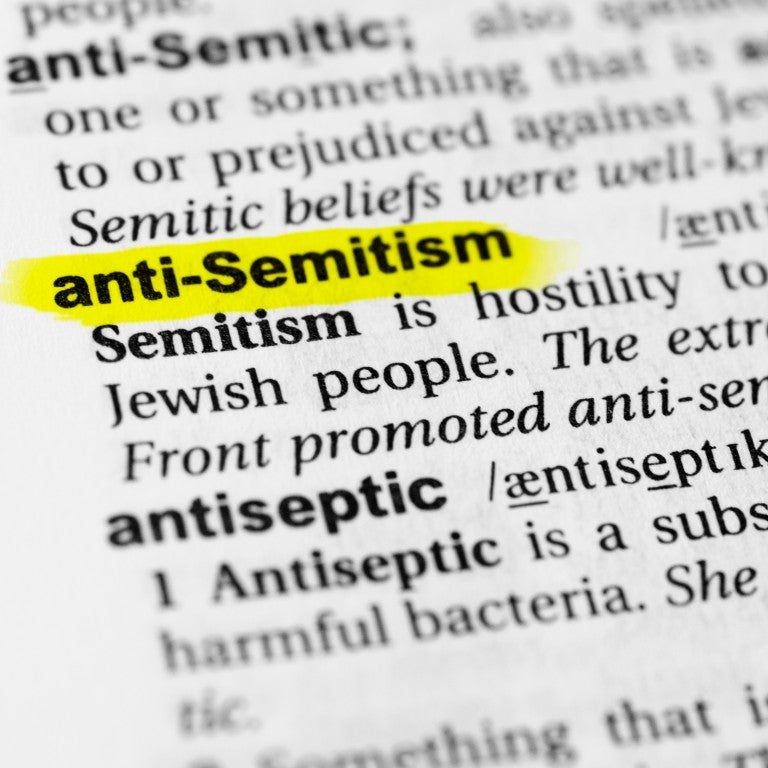February 15, 2024
American Jewish Committee (AJC) is tackling several tough questions and topics in 2023. What should we answer next? Email us at toughquestions@ajc.org to let us know. Don't miss our tough questions on Israel.
In the decades following World War II, American Jews enjoyed unparalleled success and freedoms that their ancestors and brethren in other parts of the world were long denied. However, in recent years with a trend first starting in Western Europe, antisemitism has resurfaced in alarming fashion in the United States.
From deadly attacks like the 2018 Tree of Life synagogue shooting in Pittsburgh, Pennsylvania, and the 2019 Chabad Center shooting in Poway, California, to the 2022 hostage situation at a synagogue in Colleyville, Texas, and the normalization in mainstream popular culture punctuated by the spread of antisemitic rhetoric by rapper Kanye West, basketball star Kyrie Irving, and comedian Dave Chappelle, hatred of the Jews continues to multiply in the United States.
But what is antisemitism, why has it become so common now, and why has prejudice against Jews emerged so forcefully?
To understand why, here are answers to ten tough questions about Jew-hatred, including the origins and sources of antisemitism, what it looks like today, and what Israel has to do with it.
Why is antisemitism different from other forms of hate?
Antisemitism is the most ancient hatred, rooted in Christian religious teachings that go back millennia. Over that time antisemitism has morphed into variants that are both blatant and insidious, but equally harmful to Jews. The shape-shifting nature of antisemitism is part of what sets it apart. Antisemitism is also different from other forms of racism, which often vilify victims as inferior.
In addition to emphasizing how unworthy, unclean, and greedy Jews can be, antisemitism emphasizes that Jews see themselves as superior and deny opportunities to others. It accomplishes this with conspiracy theories about Jews controlling the media, banks, and government, as well as with derogatory stereotypes such as myths about “Jewish power” or the “Jewish lobby.” This type of antisemitism, assailing Jews for their perceived power, especially resonates in today’s context of anti-racism, which aims to disrupt traditional power structures.
Both white supremacists and Black supremacists, such as followers of the Nation of Islam under Louis Farrakhan, see Jews as trying to supplant them as the superior race. White supremacists present the deadliest threat. Black supremacists, such the Black Hebrew Israelites, say they are the true Jews, the chosen people of God described in the Bible, and that “White” Jews are not the real Jews, but impostors. This ideology has come to the forefront in antisemitic statements made by rapper Kanye West, who said during an October 2022 with Fox News's Tucker Carlson that "When I say Jew, I mean the 12 lost tribes of Judah, the blood of Christ, who the people known as the race Black really are. This is who our people are.”
Viewing Jews as oppressors is another common form of antisemitism. Anti-Zionists, for example, accuse Jews collectively of ethnic cleansing by not allowing Palestinians the right to return to Israel. They cast the Israeli-Palestinian conflict as a racial conflict rather than a geopolitical or nationalist dispute. The platform of anti-racism, a purported intention to work against prejudice and bigotry, is often used by antisemites to conceal their efforts by denying self-determination and equal treatment to one minority (Jews) in order to lift up others.
The belief that the Jews, alone among the people of the world, do not have a right to self-determination — or that the Jewish people have no religious and historical connection to Israel — singles out Jews unlike any other form of discrimination.
Where does antisemitism come from?
Throughout history, antisemitism has presented itself in a number of ways, while constantly holding individual Jews responsible for the “misdeeds” of Jews in general. While there were pre-Christian Greco-Roman persecutions, anti-Jewish sentiment originally began through a Christian lens, including interpretations of Christian doctrine, and early Church fathers’ teaching of contempt toward Jews. This included the charge that Jews killed Jesus, which is known as “deicide.” The deicide charge holds all Jews responsible for that act.
In the Medieval era, this discrimination was used to scapegoat Jews for a plethora of misfortunes. Jews were blamed for the kidnapping and death of Christian children, known as the blood libel claim. They also were accused of spreading disease, a charge known as poisoning the well. As Jews began to assimilate in Europe and were allowed to take part in professions and public positions previously denied to them, conspiracies about Jewish power began to proliferate.
Since the creation of the State of Israel, antisemitism has come to target the modern Jewish collective: the Jewish state. No other country has faced such overwhelming odds against its very survival or experienced the same degree of never-ending demonization and vilification by other nations. Today’s multiform antisemitism comes from all of these concepts.
How has antisemitism evolved over time?
The tropes and conspiracy theories of antisemitism have changed and evolved throughout history to reflect current events and contexts. As mentioned in question two, anti-Jewish sentiment began through a religious lens known as the “deicide” charge. In medieval times, Jews experienced the blood libel claim, and the poisoning the well charge. Later, as Jews began to assimilate into European society, conspiracies about Jewish power began to spread, such as through the fabricated Protocols of the Elders of Zion, a fraudulent document attributed to the Russian secret police in the early 20th century and still circulated today, that serves as a rationale for antisemitism.
As eugenics –a strict pseudo-scientific hierarchy of the human race based on the false belief that selective breeding can improve a population’s genetic composition – became central to Adolf Hitler’s Nazi propaganda of the late 19th and early 20th centuries, anti-Jewish sentiment evolved through a racial lens. Aryans, or descendants of the Nordic race, occupied the top of Hitler’s hierarchy. Jews, who Hitler also blamed for Germany’s loss in World War I, occupied the bottom. His final solution for Europe’s Jewish problem was the slaughter of six million Jews during the Holocaust.
Another form of antisemitism that targets the Jewish state emerged with the creation of the State of Israel. The belief that the Jews, alone among the people of the world, do not have a right to self-determination — or that the Jewish people have no religious and historical connection to Israel — singles out and discriminates against Jews, and is fueled by the same motives that have existed for millennia.
All of these expressions of antisemitism are still found today: in societies with and without Jews, online and in textbooks across the Arab world, in both the fringes of society and, increasingly, in mainstream discourse. The shape-shifting nature of antisemitism is part of what sets it apart.
Does antisemitism come from the far-right or the far-left?
Both. Other places too. We need to unequivocally condemn all sources of antisemitism, which sometimes feed off each other, contributing to the current global rise.
One deadly threat comes from the far-right. This antisemitism comes from white supremacists who consider Jews to be the primary enemy trying to unseat the white race from the proverbial throne. In fact, antisemitism is the most enduring component of the white supremacist worldview.
An online manifesto posted by the shooter who murdered 11 worshippers at Pittsburgh’s Tree of Life Synagogue shows that white supremacists view Jews as nonwhites. The shooter committed the deadliest antisemitic attack in American history. But for a lock on the synagogue door, a similar scene could have played out in Halle, Germany when a far-right gunman tried to enter a Yom Kippur service in 2019.
Paradoxically, the far-left often views Jews as white supremacists. Amid far-left calls to tear down ingrained and unjust power structures, Jews are targeted by activists who employ antisemitic themes that Jews have too much power and privilege.
Among European intellectuals, antisemitism has emerged alongside anti-American sentiments, similar to the former Soviet Union where Jews were accused of supporting American imperialism. In fact, the Soviet Union led the effort in 1975 to link Zionism to racism, basing their accusations on the notorious Protocols of the Elders of Zion and arguing that Judaism’s concept of “the chosen people” promoted racial superiority. This deliberate slur interpolated and distorted the real meaning of Judaism, which explains the Jewish people are ‘chosen,’ or set apart, for special and burdensome religious and social obligations.
Now across Europe, the powerful U.S. is seen in the same vein as the so-called powerful Jews.
A trend toward identity politics also has contributed to antisemitism on the left, as people adopt a “with us, or against us” approach that leaves no room for disagreement on individual issues. As a result, those who support Zionism are increasingly turned away from progressive spaces advocating for social justice, even when the issue has nothing to do with Israel.
Far-left antisemitism is also expressed as opposition to Israel’s right to exist or holding all Jews responsible for Israel’s actions. Antisemitic violence and rhetoric has broken out during some pro-Palestinian/anti-Israel protests. Meanwhile, in the U.S. Congress, a growing group of far-left Democrats has accused Israel of apartheid. Specifically, U.S. Rep. Ilhan Omar (D-MN.) has said “Israel has hypnotized the world” and accused politicians who support Israel of pushing for allegiance to a foreign country – an antisemitic trope called dual loyalty.
In Britain, an antisemitic scandal rocked the left-wing Labour Party under the leadership of Jeremy Corbyn – a prime example of how one man’s contempt for Zionists helped unleash, or at the very least give fellow party members carte blanche to unleash a torrent of Jew-hatred.
Meanwhile, religious extremists, including those who espouse extremism in the name of Islam, also propagate antisemitism. In fact, every fatal attack against Jews in Europe in recent years, except for Halle, Germany, has been carried out by those who claim to act in the name of Islam. Religious extremism also fuels the ambitions of Iran, Hezbollah, and Hamas to wipe Israel off the map, making occasional far-left support of these groups quite alarming.
All these sources exist simultaneously.
What is philosemitism?
Disproportionate focus on Jews – even if positive – may hint at underlying prejudice, if not nefarious intent.
Philosemitism is a special interest in, respect for, or admiration for Jewish people, Jewish history, or Jewish stereotypes. And therein lies the problem. For example, a philosemite might prefer to hire Jewish lawyers or accountants because they believe no one manages money as well as a Jew. Journalist Yair Rosenberg sums it up this way: “At worst, given the right impetus, the coin of philo-Semitic antisemitism can easily be flipped, and all those formerly positive stereotypes can be weaponized against Jews.”
Philosemitism is also considered problematic when it creates a “good Jew-bad Jew” dichotomy - such as favoring Orthodox Jews over non-Orthodox, or non-Zionist Jews over Zionist Jews, or Jewish Republicans over Jewish Democrats.
Christian Evangelical Zionism can also be a problematic form of philosemitism. While Christian Zionists strongly support the Jewish state, a small number are pre-millennial dispensationalists, meaning they only support bringing Jews to Israel because they believe it will bring about the Rapture and the Second Coming of Jesus. This treats Jews as a means to an end and also a target for conversion. It can even set the stage for scapegoating the Jews when the Rapture doesn’t come as expected.
Are Jews white?
Viewing Jews as “white” is a recent phenomenon in framing the Israeli-Palestinian conflict. By falsely framing it as a racial conflict in which Israelis are purportedly labeled as white people, anti-Israeli activists draw false comparisons to racial inequality in the U.S. But the Israeli-Palestinian conflict is a conflict between two nationalisms - Palestinian nationalism on the one hand and Jewish nationalism, or Zionism, on the other.
Jews are European Ashkenazi Jews, Black Jews from Ethiopia, brown Jews from India, Sephardic and Mizrahi Jews from North Africa and Arab countries, Persian Jews from Iran, and more. Israel is a homeland for all Jews. The word “Jew” comes from “Judea,” the ancient name for Israel.
Casting Israel as a “white” oppressor distorts the reality of a multicultural country that guarantees civil rights for all its citizens, regardless of background or origin. It also distorts the diverse nature of the Jewish people, along with the history and danger of antisemitism. Truth is, Jews were not considered white through the late 19th and early 20th centuries, and still aren’t considered white by neo-Nazis and white supremacists.
How can Jews claim to be targets of discrimination when so many Jews are doing so well?
Renowned Jewish historian and scholar Deborah Lipstadt is fond of saying that “the racist punches down, but the antisemite often punches up.” One of the characteristics of antisemitism is that it is often connected to perceptions of power and privilege.
It is almost as though the more accepted Jews are in a society the more they stick out as “not belonging” so Jews are naturally sensitive to those pointing to wealth, power, etc.
In 2021, it’s true that there are Jews who hold positions of power in government, lead major corporations, and are well-represented among students and faculty in academic institutions. However, Jews were subject to academic quotas and other forms of discrimination only two generations ago. It does not matter to white supremacists, whether Jews are poor or privileged, they are targeted for being Jewish.
Do efforts to define antisemitism take away freedom of speech?
In the U.S., the First Amendment protects speech that’s racist, xenophobic, homophobic, and antisemitic. So, classifying speech as antisemitic does nothing to restrict it. But where such bigotry has consequences—e.g., in determining the motivation of hate crimes—it is important to know what antisemitism is. After all, the First Amendment does have limits. It does not protect incitement, defamation, fighting words, and threats to violence that are both imminent and likely. A tool to help understand all these forms of anti-Jewish hatred is important in determining the biased motivation of hate crimes that are punishable under the law.
It’s also important for promoting civil discourse in public settings and on social media. In that way, the International Holocaust Remembrance Alliance’s (IHRA) Working Definition of Antisemitism, developed in 2016, actually helps safeguard First Amendment guarantees of freedom of religion and speech. Explaining modern forms of antisemitism as IHRA’s Working Definition does prevent a “chilling effect” for members of the Jewish community who otherwise might feel afraid to openly identify as Jewish. It also discourages progressive spaces from barring Jews from participating in progressive causes because of their affiliation with Israel. AJC’s State of Antisemitism in America 2023 Report found that 85% of American Jews and 84% of the U.S. general public believe the statement “Israel has no right to exist” – the foundational core of anti-Zionism – is antisemitic.
For more information on the IHRA Working Definition of Antisemitism Definition, click here.
Is it antisemitic to criticize Israel?
Absolutely not. Those inside and outside Israel who disagree with the nation’s policies and actions have every right to speak up – and do. As the only democracy in the Middle East, a healthy and free discourse is encouraged. But it’s important to specify that “Israeli policies” or “actions of Israel’s army” are the target of criticism. Precise language distinguishes a legitimate critique from an effort to delegitimize Israel’s fundamental right to exist.
Delegitimization, demonization, and double standards are the three Ds often used as a barometer to determine whether a critique crosses the line from legitimate criticism into an antisemitic charge.
When Israel and its leaders are demonized – made to seem completely evil – or when Israel is blamed for all the violence in the Middle East, that is antisemitic. Likewise, when Israel’s policies and actions are called out as human rights abuses while horrific human rights abuses in other nations such as Iran and China go unchecked, that double standard can be another example of antisemitism.
When are anti-Zionism and criticisms of Israel considered forms of antisemitism?
Advocating for a two-state solution that includes a Palestinian nation-state, criticizing policies of the Israeli government, and speaking up in support of Palestinian rights is not anti-Zionist nor is it antisemitic. Opposition to all forms of nationalism or borders, including Jewish nationalism, is not antisemitic.
However, calling for an end to just the Jewish state crosses the line into antisemitism. The belief that the Jews, alone among the people of the world, do not have a right to self-determination — or that the Jewish people have no religious and historical connection to Israel — singles out and discriminates against Jews, which is the very definition of antisemitism.
When Jews around the world are verbally or physically harassed or Jewish institutions are vandalized in response to actions of the State of Israel, that is antisemitism.
When criticisms of Israel employ antisemitic tropes of Jewish power or greed, engage in Holocaust denial, or accuse Israelis of being the “new Nazis they cross the line into antisemitism.





